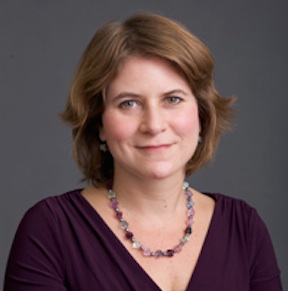
“International human rights thus offers us a new discourse,
a new rhetoric, one that has already demonstrated its ability
to inspire, to provoke new intellectual insights, and to lead
thousands of American young people to embrace activist agendas.”
— Rosa Brooks
By Cheyanne Cierpial
Rosa Brooks (ΦBK, Harvard University, 1990) is a columnist for Foreign Policy and a Senior Fellow at the New America Foundation. She is a former Pentagon official and recipient of the Secretary of Defense Medal for Outstanding Public Service who has appeared on BBC World Service, CNN’s OutFront, The Rachel Maddow Show on MSNBC, and more. Throughout her career as an expert on foreign policy and international law, Brooks has continued to utilize her liberal arts background to inform her work.
Brooks pursued her Bachelor of Arts in history and literature from Harvard University, followed by a Master’s in social anthropology from Oxford University and a law degree from Yale University. She is currently a professor at Georgetown University Law Center and the author 0f numerous publications that illustrate her liberal arts perspective.
For example, one of her recent op-eds in the Washington Post, “Who Makes Better Foreign Policy: Artists or Scientists?”, offers a critique of David Milne’s Worldmaking (Farrar, Straus and Giroux, 2015), which categorizes foreign policy officials as either artists or scientists. Brooks summarizes Milne’s book, erxplaining that that the “artists” of American foreign policy include Walter Lippmann, Henry Kissenger, and Barack Obama, as they rely on “intuition and humility” while writing off “abstract theorizing.” She writes that Milne includes Woodrow Wilson, Charles Beard, and Paul Nitze among the “scientists” who “believe they can both discern and transcend the patterns of history” and see the world as “malleable.” However, as Brooks indicates in this opinion piece, this science/art binary does not always neatly hold up.
In her forthcoming book How Everything Became War and the Military Became Everything (Simon & Schuster, 2016), Brooks collapses yet another binary: what happens when the dichotomy between war and peace becomes blurred.General James Mattis (USMC, Ret.) praises the volume as “one of the most thought-provoking books I’ve ever read. It’s as if we have been sleep walking into this new world and Rosa has turned on a flashlight to show what we are doing and where we are going.”
In addition to her scholarly work, Brooks puts her theory into practice. She has served as Counselor to Under Secretary of Defense for Policy, founded the Office for Rule of Law and International Humanitarian Policy, and, according to her Georgetown Law faculty page, “led a major overhaul of the Defense Department’s strategic communication and information operations efforts.”
She has been involved in Human Rights Watch, Amnesty International USA, the Council on Foreign Relations, and much more. She is the author of many book chapters on foreign policy, including “Drones and Cognitive Dissonance” (2014), “Civilians and Armed Conflict (2014), and “A Progressive Foreign Policy for the 21st Century” (2015), and a co-author of Can Might Make Rights? Building the Rule of Law After Military Intervention (Cambridge University Press, 2006).
As an outspoken activist and scholar, Brooks has continued to embody excellence in the liberal arts and Phi Beta Kappa’s values of intellectual integrity, a broad range of academic interest, and lifelong learning.
This unique perspective, informed by her liberal arts background, is evident in Brooks 2002 article in the Yale Journal of Law and Feminism, “Feminist Justice, At Home and Abroad: Feminist and International Law: An Opportunity for Transformation.” Here Brooks writes, “International human rights thus offers us a new discourse, a new rhetoric, one that has already demonstrated its ability to inspire, to provoke new intellectual insights, and to lead thousands of American young people to embrace activist agendas.”
Cheyanne Cierpial is a senior at Denison University majoring in English Literature and minoring in Psychology. Denison University is home to the Theta of Ohio Chapter of Phi Beta Kappa.




